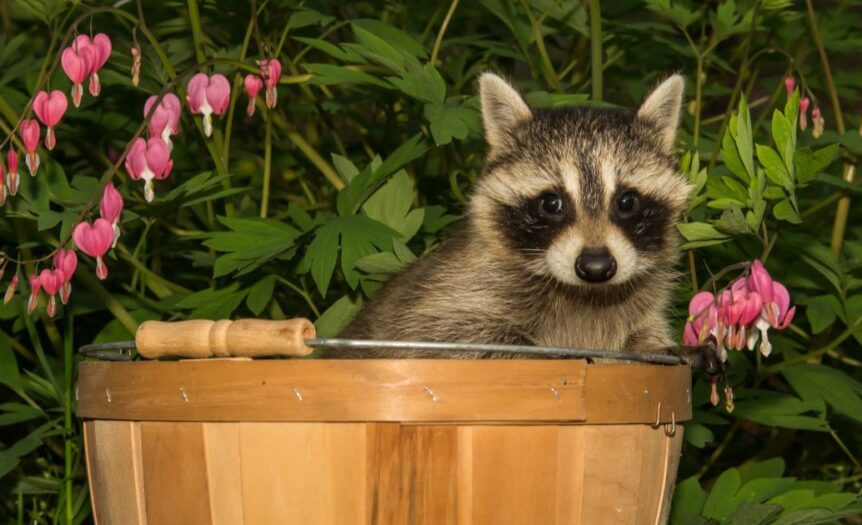Raccoons can be a significant challenge in maintaining your garden. They are notorious for digging up plants, raiding compost bins, and knocking over garden decorations. Implementing effective garden raccoon control tips can help protect your plants and keep your outdoor space thriving.
Start by securing your trash cans with tight-fitting lids, as raccoons are often attracted to easy food sources. Additionally, consider using motion-activated lights or sprinklers to deter them from approaching your garden at night. Establishing physical barriers, such as underground fences, can prevent these clever animals from entering your space.
Keeping your garden clean and free of fallen fruit or debris reduces attractants. You might also explore natural deterrents, such as certain smells raccoons dislike. By taking proactive measures, you can enjoy a raccoon-free garden while preserving your plants and enjoying your outdoor environment.
The Workarounds of Raccoon Behavior
Recognizing raccoon behavior is essential for effectively managing their presence in your garden. By being aware of their habits and what attracts them, you can implement better strategies to deter them.
Natural Habits and Garden Attractions
Raccoons are naturally curious and highly adaptable animals. They often forage for food at night, using their keen sense of smell to locate potential meals. Their diet includes fruits, vegetables, and insects, making gardens a prime target.
When you cultivate a wildlife-friendly garden, the chances of attracting raccoons increase. They are particularly drawn to easy food sources such as fallen fruits and unsecured trash. Secure compost bins and use fencing if necessary to keep raccoons at bay.
In Oklahoma, where raccoons are prevalent, consider removing food options like pet food left outdoors. These steps in green area pest management can minimize issues with these nocturnal creatures.
Preventive Measures Against Raccoons
Taking proactive steps can help protect your garden from raccoons. This includes strategies that deter their presence, garden designs that keep them out, and eco-friendly barriers.
Garden Raccoon Prevention Strategies
To deter raccoons, start by securing food sources. Store pet food, birdseed, and trash in raccoon-proof containers. Use tight-fitting lids and keep bins in a secured area. Clean up fallen fruit and vegetables immediately, as these attract wildlife.
Consider scent deterrents like citrus peels or vinegar. Raccoons dislike these odors, so placing them around the garden can be effective. Motion-activated lights and sprinklers can also startle raccoons and discourage their visits.

Regularly inspect your garden for entry points. Pay attention to gaps under fences and around gates. Ensure that these areas are well-maintained to minimize access.
Raccoon-Proof Garden Design
Designing a raccoon-proof garden focuses on physical barriers and plant selection. Start with fencing; fences should be 4-6 feet high, with the top angled inward to prevent climbing.
Use mesh or hardware cloth buried at least a foot underground along the bottom of the fence. This will discourage digging. Raised garden beds can also be effective, as they make it harder for raccoons to reach your plants.
Select plants that raccoons find unappealing, such as herbs like lavender and mint. These can act as natural deterrents while providing an aromatic garden.
Implementing Eco-Friendly Raccoon Barriers
Using eco-friendly barriers can effectively keep raccoons away. A simple option is planting thorny bushes or installing trellises with climbing vines. These natural barriers can deter raccoons from entering your garden area.
You might also consider creating a noise deterrent system. Hanging wind chimes, aluminum foil strips, or old CDs can create sounds that scare raccoons off.
Another eco-friendly option is using non-toxic repellents derived from essential oils. Sprays containing peppermint, citronella, or garlic can be applied around your garden. To maintain their effectiveness, reapply these regularly, especially after rain.
Effective Raccoon Deterrents and Removal
To manage raccoon issues effectively, you must choose appropriate deterrents and be aware of eco-friendly removal methods. Implementing these strategies can help protect your garden from damage.
Choosing the Right Raccoon Deterrents
When selecting raccoon deterrents in Oklahoma, consider motion-activated sprinklers, ultrasonic repellents, and physical barriers. Motion-activated sprinklers startle raccoons with sudden bursts of water, which can discourage them from approaching your garden.
Ultrasonic repellents emit high-frequency sounds that are unpleasant for raccoons but inaudible to humans. Additionally, installing tall fences (at least 4-5 feet) that extend underground can effectively keep raccoons out.
Strong-smelling substances like ammonia or cayenne pepper can also deter these animals, as they dislike the odor. Make sure to reapply these deterrents regularly for continuous effectiveness.
Eco-Friendly Raccoon Removal Techniques
Focus on humane methods for eco-friendly raccoon removal. Seal entry points to prevent raccoons from entering your home and garden.
Traps can be an option, but ensure they are humane and allow for safe release nearby. Before using traps, check local regulations regarding raccoon trapping and relocation.

Another effective technique is using noise to encourage raccoons to leave. Low-frequency sounds, like those from a radio, can create an unwelcoming environment for them.
Always prioritize these gentle methods to keep your garden safe while respecting local wildlife.
Maintaining a Raccoon-Free Garden
Effective garden management can deter raccoons from invading. By implementing straightforward steps and monitoring your garden regularly, you can create an environment less appealing to these pests.
Regular Garden Upkeep
Keeping your garden tidy is essential. Start by removing food sources, such as fallen fruits or accessible pet food. Secure garbage bins with tight-fitting lids to prevent unwanted access.
Regularly prune and trim shrubs to reduce dense hiding spots. Raccoons feel safer in areas that offer cover.
Inspect your garden for holes or gaps in fences. Consider installing barriers like fencing at least three feet high and buried a foot deep. This prevents raccoons from digging underneath or climbing over.
Additionally, use motion-activated lights or sprinklers to create a less welcoming environment. These can startle raccoons and discourage them from lingering.
Monitoring and Adapting Strategies
Constant vigilance is key to maintaining a raccoon-free garden. Check for signs of raccoon activity, such as tracks or droppings, which indicate their presence.
Assess your garden’s layout regularly. If raccoons frequently visit, consider adjusting your planting to include less attractive options.
Maintaining a green area pest management plan can involve rotating crops, especially if certain plants draw raccoons.
Using wildlife-friendly repellents can also help. Be sure to apply them according to instructions for optimal effectiveness.
If you continue experiencing issues, reach out to professionals. Critter Stop has a fantastic reputation and online customer reviews because it provides high-quality work and great customer service. Call Critter Stop at (405) 645-5450 for a free inspection to solve your problem with wildlife or pest removal from your property.



